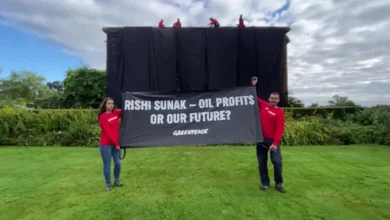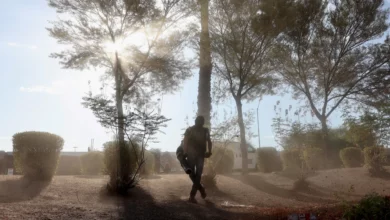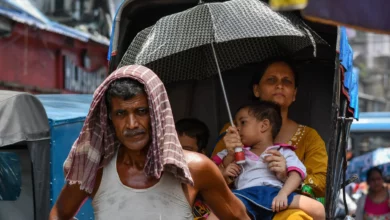
Tashka Yawanawa's Amazonian tribe lived on the plains along the Gregorio River for millennia — until a wall of flood water last year forced them to flee their homes for good.
"We had never seen a flood this big, this fast, this ferocious," the tribal chief told AFP on the sidelines of UN climate talks in Paris aimed at agreeing on a pact to stave off disastrous climate change.
He chalked the flooding disaster up to global warming.
"This was the first time we felt the direct impact of climate change," the 40-year-old said at Le Bourget airport on the northern outskirts of Paris, standing out in an elaborate headdress of tall, bright feathers among the throngs of negotiators in suits.
"Now we have to change our life and move to the hills."
Scientists caution against linking a single extreme weather event to an unpredictable and long-term phenomenon such as climate change.
However, there is a growing body of evidence that some environmental changes can already be blamed on planet warming caused by humanity's greenhouse gas emissions.
Such changes hit indigenous communities first because they live beyond the safety cushion of money and technology — relying as they do on nature for food, shelter and medicine.
Indigenous groups from Africa to the Arctic have gathered at the Paris climate conference — tasked with crafting a climate rescue pact — to call for a robust deal to help protect their way of life.
In the Democratic Republic of Congo, for example, the Bambuti Pygmy people are finding it ever harder to source food.
Joseph Itongwa, a hunter-gatherer of forest foods, said warmer temperatures have forced small game like porcupines to higher, cooler climes.
"We can spend the whole day looking for them and not find any. It was a lot easier 10 years ago," the 43-year-old said.
"Plants are disappearing too. That is not only bad for our food supply, but for our medicines too."
Pygmies are central African nomads whose very survival depends on what nature can provide.
Not fair
Like many indigenous peoples they face discrimination and mistreatment from majority communities, while farming, mining and deforestation encroaches upon their traditional way of life.
"We have been forced to directly change our way of living," Itongwa said. "And that is a problem. We are losing our identity."
Thousands of kilometers away in the Arctic and sub-Arctic regions of northern Canada, the mercury is rising at double the global rate.
Clayton Thomas-Muller, a member of the Cree aboriginal group, said warmer temperatures in his north Manitoba region have made winter ice unstable — interfering with life-sustaining fishing.
"When the ice is not as thick, you just don't (fish)," said Thomas-Muller, 38, as a fisherman could fall through the ice and drown.
Instead, "you go shop at the store," he said. "And then you get diabetes because… it's all processed food."
Obesity is one of many problems Canada's indigenous communities struggle with, as long relied-upon natural resources are dwindling.
Candido Mezua Salazar is a member of the Embera indigenous community in Panama, and earns a living growing plantains.
But falling river levels in recent years — driven by irregular and insufficient rainfall — have taken a big bite out of his earnings.
Years ago, Salazar could load 10,000 plantains onto his boat and float off to the market.
Today, he cannot carry more than 2,000, or the weight pushes his craft into the mud.
"I cannot say exactly how much the changes have cost me, but I cannot sell my produce, which hurts me and my family," he said in Paris.
Yawanawa's community, meanwhile, is still recovering from the November 2014 flood.
His tribe are building new homes some 100 meters (328 feet) up a hillside in an effort to get out of harm's way.
"The people who are the most exposed to climate change are the people who live in the forest, in peace with the forest and who depend on it to eat and live," he said.
"And it's those people who least contributed to these changes," he said.




